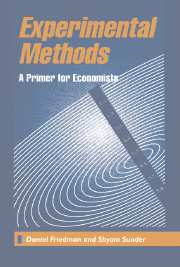Book contents
- Frontmatter
- Contents
- List of figures and tables
- Preface
- Acknowledgments
- EXPERIMENTAL METHODS
- 1 Introduction
- 2 Principles of economics experiments
- 3 Experimental design
- 4 Human Subjects
- 5 Laboratory facilities
- 6 Conducting an experiment
- 7 Data analysis
- 8 Reporting your results
- 9 The emergence of experimental economics
- Appendixes: Supplemental materials
- Glossary
- References
- Index
8 - Reporting your results
Published online by Cambridge University Press: 05 June 2012
- Frontmatter
- Contents
- List of figures and tables
- Preface
- Acknowledgments
- EXPERIMENTAL METHODS
- 1 Introduction
- 2 Principles of economics experiments
- 3 Experimental design
- 4 Human Subjects
- 5 Laboratory facilities
- 6 Conducting an experiment
- 7 Data analysis
- 8 Reporting your results
- 9 The emergence of experimental economics
- Appendixes: Supplemental materials
- Glossary
- References
- Index
Summary
You have thought through some important economic issue, found a way to examine it in the laboratory, designed an appropriate set of experiments, run them, and analyzed the data. You have learned a lot through the whole process, and it appears that the results may interest, even surprise others. Time to kick back and congratulate yourself on a job well done? Well, don't relax quite yet. You still have to present your results to your peers. If your write-up is sloppy or confusing, all your hard work probably will have no impact on others. If you report your results effectively, you may help people change how they think about the issue. You already have had the personal satisfaction of learning something new. Now by effectively communicating this learning to others, you can amplify the social benefit of your work as well as your personal satisfaction.
This chapter offers suggestions on how to report the results of your experiments effectively. We emphasize the preparation of articles for academic journals, but most of the suggestions apply equally well to seminar presentations, consulting reports, or book chapters. The first section discusses the scope of research you should try to cover in a single paper. Next we present customary ways of organizing the paper, and offer advice on polishing your prose, tables, and figures. The rest of the chapter discusses current standards for documenting your work and offers advice on how to schedule various stages of your project.
- Type
- Chapter
- Information
- Experimental MethodsA Primer for Economists, pp. 110 - 120Publisher: Cambridge University PressPrint publication year: 1994



